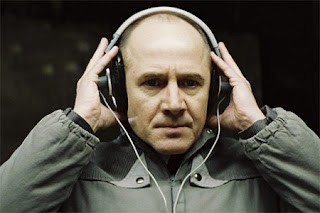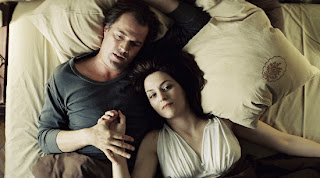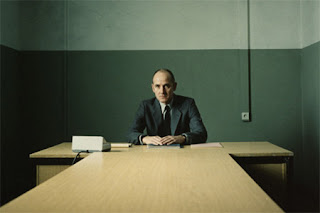Last night I watched one of my favorite movies with a friend
who’s just decided to get more into classic cinema. This is a life choice that
I approve wholeheartedly, so I was happy to help her out. We watched The Lives of Others, the 2006 Best
Foreign Film winner at the Oscars, and one of my all time ugly cry movies. But,
like, in a good way.
As I was watching, and remarking with apparently irritating
regularity, “I love this movie!”, I realized something actually kind of bad
about it. It has one female character in the whole thing. Literally one. And
she sucks.
Okay, let me back up here.
The Lives of Others
(or, in German, Das Leben Der Anderen)
is a historical piece set back in 1984 in East Germany. That’s not really a
time we study much in history here in the grand old United States, so let me
break it down for you. After World War II, the Allies decided that Germany
needed some help getting back on its feet. You could see a direct line from the
economic devastation of the first World War in Germany to the rise of the Nazi
party, and no one wanted that to happen again.
At the end, the Soviets invaded Germany on one side, and the
US and UK and France pushed in on the other. They met in the middle, and
decided to split the country there. Half would be under Western control, the
clearly named West Germany. It was capitalist, received billions in aid under
the Marshall Plan, and became an economic power in the next half century.
The other half was under Soviet Control, and became the
“German Democratic Republic,” or East Germany. It was socialist, less
developed, and had a comparatively weaker economy.
Now, I’m not here to get into whether or not East Germany
was bad. If you want an actual German analysis of that, I suggest you watch Goodbye Lenin! or one of the other
awesome films that examines this. I’m more just saying that this is a thing
that happened.
They also, at the time, divided Berlin down the middle, with
the Eastern half belonging to East Germany and the Western half belonging to,
obviously, West Germany. There was a wall, it was kind of a thing.
The Lives of Others
concerns itself with the very last days of East Germany, as it the country was
starting to shrivel up into itself and security was paramount. It follows an
officer with State Security, or Stasi, the secret police, who investigates
potential threats to the republic. He’s very good at his job. The best, really.
Think Hans Landa from Inglorious Basterds,
if he never talked and definitely had a soul.
Wiesler, the officer, is assigned to do surveillance on a
playwright, Georg Dreyman, and, by extension, his talented actress girlfriend,
Christa-Maria Sieland. We’re just going to call them Dreyman and Christa, okay?
The story follows Wiesler as he becomes emotionally involved
in Dreyman and Christa’s lives through his surveillance. They’re under constant
wiretapping, and Wiesler, though he starts out irritated at Dreyman and eager
to peg him as a Western sympathizer, comes to really love them. He feels for
their frustrations under the stifling artistic code of East Germany, and he
sees how some of the government’s actions have really hurt art itself. Wiesler
learns to feel.
It’s a beautiful story that is incredibly hard to explain,
since it largely consists of the main character saying nothing and watching
other people do things for two hours, but let me express to you how much this
movie means to me and how much I think that everyone interested in the arts,
politics, or even just people should totally watch this movie.
Now let me complain about it.
Christa is the only female character in this entire film.
Literally. The only other female people who have any lines at all is a
prostitute who is on screen for a minute and a half in the middle of the film,
and Dreyman’s next door neighbor, who is scared by the Stasi and ties his tie
once. That’s it. Christa doesn’t even have any female friends, at least not
that we see.
Obviously, the writers don’t hate women, and they probably
didn’t even realize that they’d somehow managed to make women completely
ancillary to their story. But they did. Oh did they.
Christa-Maria therefore stands in as the only expression of
femininity in the entire film. And while this is problematic in general, there
is also something really disturbing about the fact that it’s Christa who has to
do this. Because Christa, lovely and empathetic though she is, is a pain-pill
addicted, weak, crying, self-loathing girlfriend
to the main character, whose use of her sexuality and fear of not being
noticed eventually get her killed.
Oh yeah. Spoilers. Eh, it’s not a huge surprise. And it’ll
surprise you how it happens.
Christa is a terrible character. We’re told that she’s
beautiful and talented, and while I totally believe that, it still doesn’t
excuse the way that she is written to be weak-willed and flighty. Dreyman’s
friends think that she can’t be trusted, that she’ll inform on them. And
they’re right.
I don’t really want to pile on Christa, though, because she
has a lot of her own problems, so much as I want to point out that it didn’t
have to be this way. Christa didn’t have to be the only female character in the
whole fricking movie.
One thing that the Soviet republics did better than anywhere
else in the world, and I mean this totally earnestly, is that they were far more
egalitarian. Men and women worked the same jobs for the same pay and no one
really had a big problem with it. Since Russia had been doing this since the
1920s, it made adopting the practice easier in the satellite states.
I say this because there is absolutely no reason why
Wiesler’s friend and superior Stasi officer, Grubitz, couldn’t have been played
by a woman.
There’s really nothing in Grubitz’ character that is
particularly gendered. He’s ambitious, but so is nearly everyone. He’s
comfortable stealing Wiesler’s ideas, using intimidation, and pulling himself
up through the party on other people’s backs, but, again, those aren’t gendered
traits.
It’s not that I think Grubitz is particularly womanly, or
that I feel slighted that he couldn’t have a romantic history with Wiesler or
something. I wouldn’t change anything about that relationship at all, really.
It would just be another thing that Wiesler deals with about his friend.
Grubitz is willing to sell him out. Grubitz is also a woman. Wiesler wouldn’t
care.
What this would give the movie, though, is two strong,
interesting female characters who not only interact, but interact with high
stakes and multiple times. Moreover, it would give us two ideas of what it
means to be a woman in East Germany.
I’m not saying two is enough or anything. It’s still not.
But with two different perceptions of East German womanhood, the pressure would
be off of Christa. I think she’s a fascinating character and really well
written. I just also think that when she’s the only woman in the movie, it’s
pretty sad. If Grubitz were a woman, then we could see two different lives play
out, marked by two very different sets of choices.
It would also, and this is very specific to a reading of the
film, match the male storyline perfectly. Wiesler and Dreyman work as
counterparts to each other. They’re about the same age, have similar interests
when you get down to it, and both feel strongly about the state of their
country. They’ve just made vastly different choices about how to live their
lives. How awesome would it be to see that paralleled in a female storyline?
Super awesome. That’s how awesome.
When you get down to it, it’s not all about putting women in
the movie for the sake of having women in the movie. That totally misses the
point. Issues like this are about how we perceive femininity, and what happens
when we are only given a very specific lens through which to view it. As a
singular character, Christa is fascinating and beautifully written. As a
stand-in for women everywhere, she stinks.
We need more female characters because we need more stories
being told. It just makes for better movies, television shows, books, and
comics, when the female lives we see are just as rich as the male.
Also you should totally watch The Lives of Others.
 |
| Yes it is a depressing German historical film about a middle-aged man who sits in an attic and doesn't talk. Watch it anyway. |







Keen & accurate observations! This is the best movie!
ReplyDelete